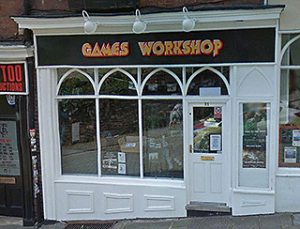Report Back
 REPORT OF MEETING Friday October 12 2018
REPORT OF MEETING Friday October 12 2018
It’s not often we get two distinguished speakers, but the games industry is keen to burnish its image; so our October meeting welcomed Dr Jo Twist OBE, CEO of Ukie, the trade association for “interactive entertainment” (video games, virtual reality and the like), with Ian Livingstone CBE, legendary founder of Games Workshop.
Ian describes himself as “Patient Zero for the epidemic of UK geek culture”; a geeky teenager from Altrincham with specs and beard, he left school with only 1 A level as he and his pals were spending too much time on video games. Mentions of Pong, Pacman and Space Invaders brought nostalgic sighs from his audience! The friends wanted to make a living out of their obsession and came up with a Newsletter; a copy found its way to the developer of Dungeons and Dragons who offered an exclusive sales license. Soon customers were gathering outside their flat, to the landlord’s annoyance; he threw them out. So today’s very rich man dossed in a bus in a carpark for 4 months, until the money started rolling in. And it has never stopped.
It’s 40 years since the first Games Workshop store opened in west London, with customers queuing round the block. Soon they developed their own intellectual property: Warhammer, leading to more shops where games and kit can be tried and bought. A series of games books, Fighting Fantasy, were also staggeringly successful and sold over 20 million copies. Ian sold Games Workshop many years ago for £10m, which looks paltry now it’s worth £1billion on the stock market; but he’s a happy man, and I’d guess, still a geek at heart.
Jo Twist put numbers on the national picture. 2½million Brits play regularly in a business worth £2.8 billion and rocketing; last year British consumers spent £5.1bn on games, we are the 5th largest global market. Our UK creative industries are worth £10m an hour to the economy and are recognised as the best in Europe (we can’t say that of much else.. the Royal family, perhaps?). 30,000 creative people work in the UK industry in highly skilled and well-paid jobs; their productivity is higher than in banking. Government has helped with tax breaks and the UK Games Fund, pushing at the cutting edge of digital innovation. Over 2,800 firms have joined Ukie; two-thirds have been set up since 2010, when the iPhone and iPad meant anyone could play, anywhere, and most are outside London with Leamington now known as “Silicon Spa.”
The appeal is much wider than geeky kids. Virtual reality is proving useful for training everyone from surgeons to pilots. You can now walk round the Natural History Museum with David Attenborough and handle the exhibits. A recent development is “eSports” in which huge tournaments take place and thousands of spectators watch the best players go head to head. “Like watching any other sport, perhaps?” Jo observed.
Worldwide, the numbers are breath-taking. 2.5bn gamers (not gaming – that’s gambling). 95% of children play some game or other. It’s worth $110bn globally and is forecast to double in 4 years. That’s bigger than films and music put together, yet there are few household names.

We asked, Why are so many games violent? “They were designed by boys for boys,” Ian said. But games now have age ratings; under 18s should not be playing Grand Theft Auto, period. Similarly, too much screen time is seriously bad for kids, and their health and school work – the World Health Organisation is proposing to include “gaming disorder” as a recognised disease. “It is up to parents to set playing time, and enforce it. Less than one on five parents do this,” said Jo. One member, Debbie Lees of Travel Counsellors, a supporter of the charity Changing Faces, asked if we could abandon the assumption that baddies are always deformed or ugly. So we pressed the games makers on their responsibilities, and I am not sure we were entirely satisfied.
Ian is now helping set up two free schools, where the focus will be on digital skills and computing. Conventional schools stifle enterprise and the imagination, in his view; we teach with too much reverence for old skills, and not enough for the future. “All games are educational,” he insisted. “They make you think, solve problems, cope with failure – you can go back and try again, till you get it right. Great training for real life.” He’s now writing his life story, and it would make a great movie. Ready Player One? Ready.
